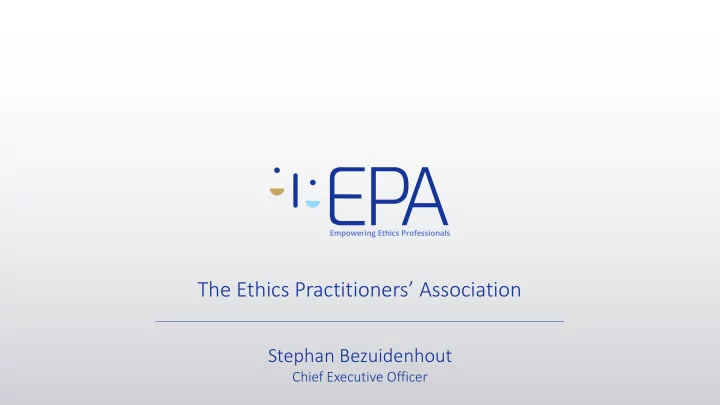

Empowering Ethics Professionals The Ethics Practitioners’ Association Stephan Bezuidenhout Chief Executive Officer
Corporate Social and Ethical Responsibility • The dawn of democracy in South Africa was accompanied by a growing awareness of corporate social and ethical responsibility • Government introduced series of laws • Private sector took initiative through King Reports (I - IV)
King IV - Social and Ethics Governance • Starts with “Leadership, ethics and corporate citizenship” • Recognition that good governance starts with – and cannot be sustained without – ethical leadership and corporate responsibility • Two principles address the governance of social and ethics performance; • Corporate Social Performance • Corporate Ethics Performance
Principle 1 - Corporate Social Performance • “The governing body should ensure that the organisation is and is seen to be a responsible corporate citizen” (Principle 3) • Concept implies that organisations have responsibilities beyond their shareholders • Also impact on employees, society, the economy and the natural environment
Principle 2 - Corporate Ethics Performance • “The governing body should govern the ethics of the organisation in a way that supports the establishment of an ethical culture ” (Principle 2) • Ethics of the company is governed well • King IV introduces elements of ethics management process
Companies Act on Social and Ethics Governance • Companies Act: • “Reaffirm the concept of the company as a means of achieving economic and social benefits” (Section7(d)) • Companies are not regarded as mere vehicles for creating wealth for shareholders, but also for producing wider economic and social benefits to society • Social and Ethics Committee a mechanism for ensuring this
Organizational Ethical Culture • “The governing body should govern the ethics of the organisation in a way that supports the establishment of an ethical culture” • Increased focus on organisational ethical culture • Move beyond ethics management programmes and focus on organisational culture • May tick all boxes insofar as the mechanics and reporting of ethics management activities concerned, ethical culture is fragile and underdeveloped
The Ethics Office - Ethics Practitioner • Organisations assign responsibility to a purposefully established intra- organisational function
The Ethics Practitioner • The Ethics Practitioner ensures that an organisation conducts its business in a manner that is aligned with the organisational values and standards of behaviour as espoused in its code of ethics • Integrating ethics in the business strategy • Challenging corporate values, standards and business decisions • Safeguarding and embedding organisational standards of behaviour • Debating difficult ethical issues • Advisory, education and training on ethical standards • Manage safe-reporting mechanisms • Ethics investigations
The Ethics Practitioner • Types of unethical conduct in the workplace • Crimes such as theft, fraud and corruption • People related transgressions such as victimization, bullying, discrimination and harassment • Other questionable conduct such as nepotism and conflict of interest
The Ethics Practitioner and other Professionals • HR structures • Governance structures • Company Secretariat, Compliance, Risk and Audit functions – combined assurance • Close relationship with Forensics functions • Investigations • Safe-reporting mechanisms
Tools for Ethics Practitioner • Philosophy approach most beneficial • Conceptual Analysis • Integrity • Respect • Critical Thinking • Utilize different mechanisms and tools for solving ethical dilemmas • Utilitarian Theory • Deontological Theory • Virtue Theory
Empowering Ethics Professionals
Purpose The EPA will empo members , and indirectly, empower er it its member their empl ons to build and sustain employer er or organisation good corporate citizenry - ultimately bene benefiting ng Sou South Af Africa as as a wh whole . The EPA will provide re es , researc rch an and bes best pr practices ne networking ng op oppor ortunities and ac accredit itatio ion to its members. The result is having sk credible ethics skilled an and cr professionals that can in guide ethical influ fluence an and gu leadership in their respective organisations.
Vision “E “Empowering Ethics cs Professionals”
www.epa-africa.com info@epa-africa.com
Empowering Ethics Professionals Thank You Credit to The Ethics Institute’s Handbook series for graphs, diagrams and research
Recommend
More recommend